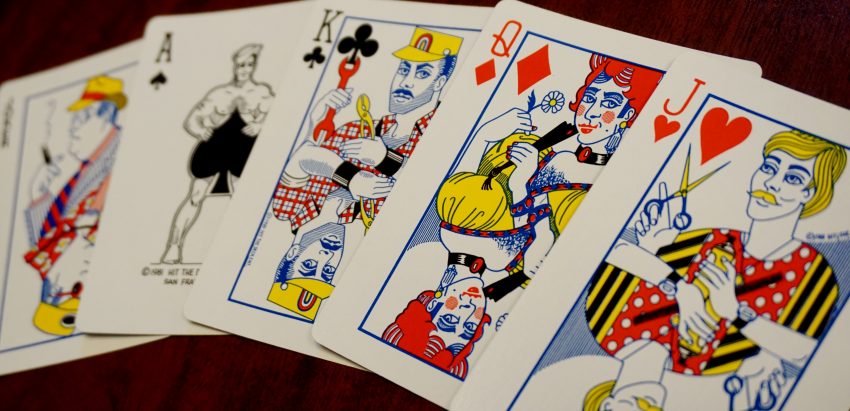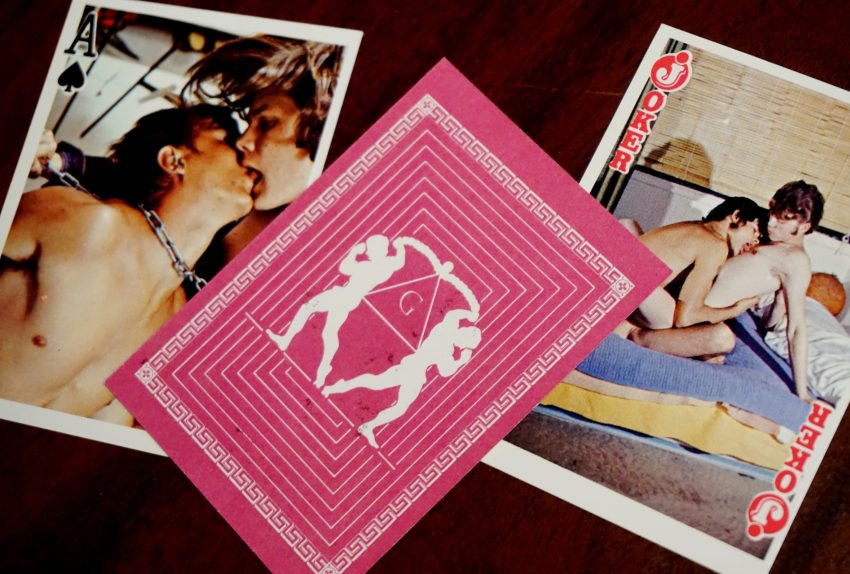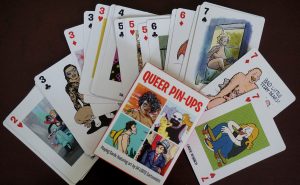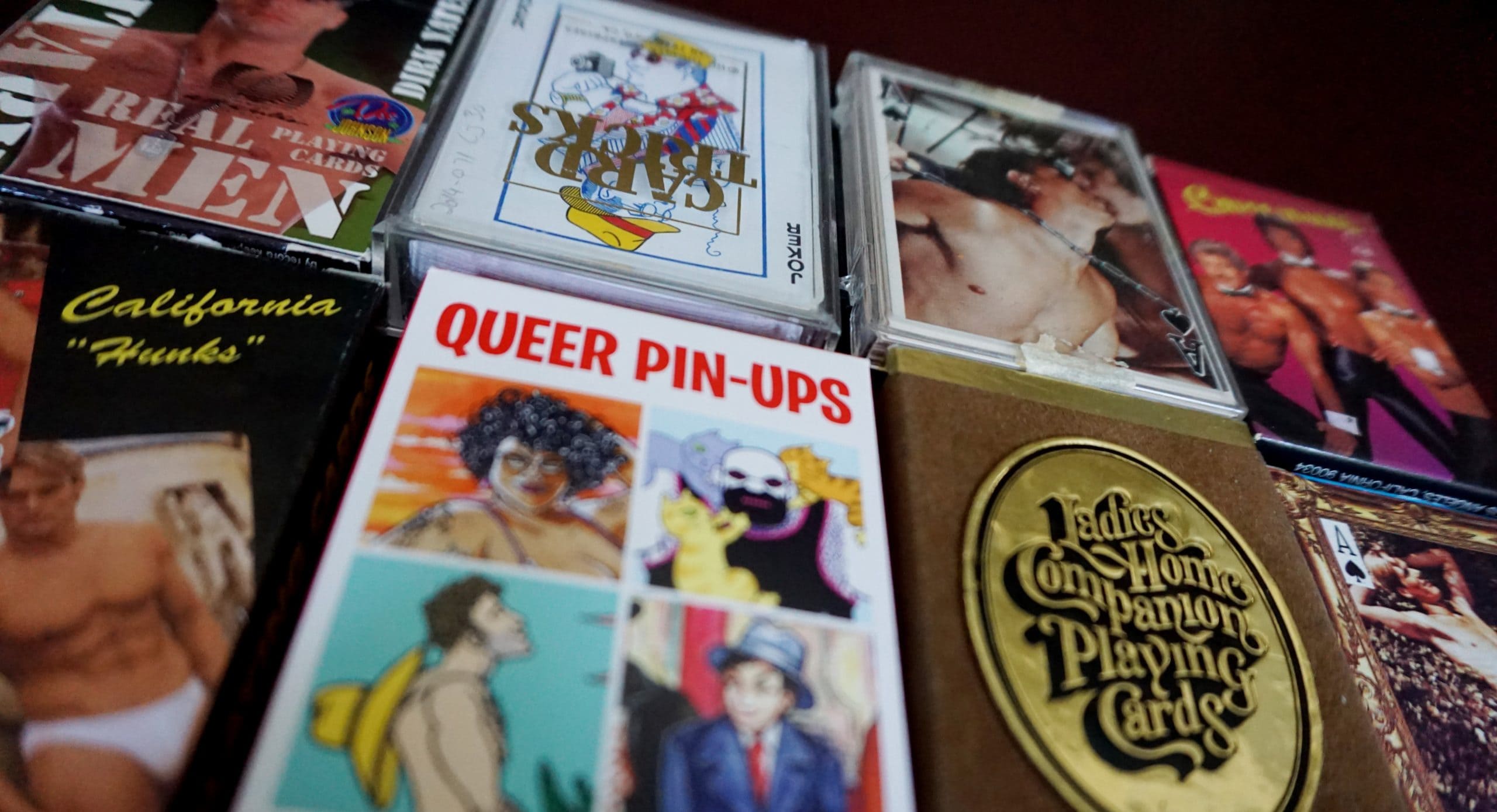We don’t play our cards close to our chest at The ArQuives. Quite the contrary! We have a fascinating collection of playing cards available for researchers to shuffle through without the risk of upsetting the dealer. While some may dismiss these as just novelty items, playing cards offer valuable insights into the mainstream history of popular culture, sexuality, aesthetics, and entertainment in the LGBTQ2+ community. At the same time, they expose the gaps in that history by traditionally representing only men. Now ready your hand and let’s go fish through some of our decks!  This set by San Francisco’s Hit The Deck Enterprises from 1981 entitled “Card Tricks” seems to be your standard deck. However, among the Kings, Queens, and Jacks you can find a mechanic, drag queens, a hair stylist, an interior designer, and a cowboy. A muscular sailor grins slyly on the Ace of Spades, his crotch covered by the spade itself. By using graphic illustrations rather than photographs, this deck relies on stereotypical representations to make it instantly clear that it is geared towards the LGBTQ2+ community, and more specifically, gay and bisexual men.
This set by San Francisco’s Hit The Deck Enterprises from 1981 entitled “Card Tricks” seems to be your standard deck. However, among the Kings, Queens, and Jacks you can find a mechanic, drag queens, a hair stylist, an interior designer, and a cowboy. A muscular sailor grins slyly on the Ace of Spades, his crotch covered by the spade itself. By using graphic illustrations rather than photographs, this deck relies on stereotypical representations to make it instantly clear that it is geared towards the LGBTQ2+ community, and more specifically, gay and bisexual men.  This deck from the 1970s is the most explicit of the bunch. Each card is decorated with two men engaged in a sexual act. Many of the cards do away with conventional ideas of what sex is and should be, featuring S&M, leather-play, outdoor-play, and cruising.
This deck from the 1970s is the most explicit of the bunch. Each card is decorated with two men engaged in a sexual act. Many of the cards do away with conventional ideas of what sex is and should be, featuring S&M, leather-play, outdoor-play, and cruising.  The Ladies Home Companion Playing Cards, produced by San Francisco’s Bo-Tree Production in 1972, are unique in our collection of cards from the ’70s because they include visible minorities on more than just one or two cards. The deck only features 13 models, but this includes one Black model and one Asian model, so they appear multiple times throughout. Notably, the images on these cards were produced by women, Carol (Fulton) Turner and Judy Horst (learn more here). This may explain why the images have a significantly different tone than others found on playing cards in our collections. Here the models are more relaxed, and their genitalia is often hidden or in the cover of shadow. Despite the name, it is unclear if these cards were marketed primarily towards women.
The Ladies Home Companion Playing Cards, produced by San Francisco’s Bo-Tree Production in 1972, are unique in our collection of cards from the ’70s because they include visible minorities on more than just one or two cards. The deck only features 13 models, but this includes one Black model and one Asian model, so they appear multiple times throughout. Notably, the images on these cards were produced by women, Carol (Fulton) Turner and Judy Horst (learn more here). This may explain why the images have a significantly different tone than others found on playing cards in our collections. Here the models are more relaxed, and their genitalia is often hidden or in the cover of shadow. Despite the name, it is unclear if these cards were marketed primarily towards women.  Last, but definitely not least, is Queer Pin-Ups, my personal favourite set of playing cards housed at The ArQuives. These cards feature art by 54 LGBTQ cartoonists, including Alison Bechdel and Howard Cruse. This limited edition set was created to raise funds for the Queers & Comics Conference presented by CLAGS: The Center for LGBTQ Studies in New York City during May 2015. They reflect much more of the diversity within the LGBTQ2+ community and have a wide-range of artistic styles and perspectives.
Last, but definitely not least, is Queer Pin-Ups, my personal favourite set of playing cards housed at The ArQuives. These cards feature art by 54 LGBTQ cartoonists, including Alison Bechdel and Howard Cruse. This limited edition set was created to raise funds for the Queers & Comics Conference presented by CLAGS: The Center for LGBTQ Studies in New York City during May 2015. They reflect much more of the diversity within the LGBTQ2+ community and have a wide-range of artistic styles and perspectives.
A closer look at some of the cards referenced here.
All playing cards featured here are available on-site at 34 Isabella Street. If you would like to work with them, please send us an email at queeries@arquives.ca. Author: Michael Pereira, Volunteer

